What fears hold you back as a business owner? Are you worried about public speaking, understanding a detailed financial analysis or simply making a mistake? It’s time you started being comfortable with being uncomfortable.

As Marcus Lemonis says, “Things are always going to go wrong. People make mistakes. I know I do. It’s how you resolve it that matters most. Listen, be open to criticism, resolve it with speed and empathy, and take responsibility.”
Maybe you are the kind of business owner who wakes up every morning ready to take on the world. Your mind is already going 90 miles per hour as you plan your activities for the day. But the thought of taking a 10-minute break just to reflect on where your business might be in five years makes you uncomfortable.
On the other hand, you might get up and immediately start worrying about what might go wrong. As a result, you focus on avoiding a mistake rather than capitalizing on a market opportunity.
Taking a risk that could produce big rewards is not a comfortable step for you.
Regardless of your personality or leadership style, being comfortable with being uncomfortable can go a long way to improving your people, processes and products – the foundation for a successful business, according to Marcus.
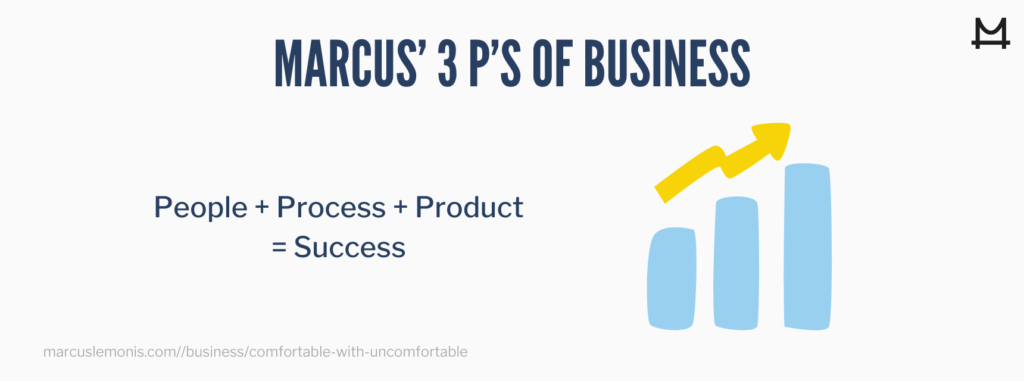
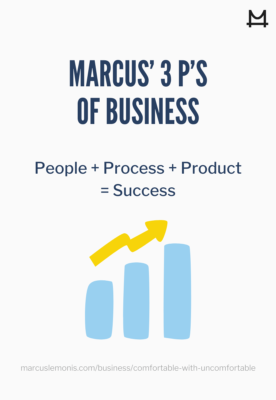
Of course, there are many other situations in business that can feel uncomfortable for an owner. For instance, Marcus was interested in investing in a gourmet marshmallow business, founded by business partners and eventual spouses, in the Midwest. While one of the partners was an expert chef, she was reluctant to confront her father who owned the store and ran a spice-manufacturing business in the same facility. He also asked his daughter and daughter-in-law to pay rent for their store to pay off his own loan – a situation that drained funds from the marshmallow business. But it seemed that the chef was uncomfortable about confronting her father about the financial problem, and as a result the owners lost out on an expansion opportunity.
Develop Self-Awareness
The most important step toward being comfortable with being uncomfortable is developing self-awareness. You can’t start learning new skills or cultivating a new attitude unless you understand your fears and anxieties.

To do so, you might take a few moments to think about what makes you uncomfortable. Is it criticism from a friend or colleague? Is it a lack of familiarity with mathematics or databases? Or could it be worries about making a mistake that jeopardizes your livelihood?
Whatever the case, you are not alone. It seems that every adult has a comfort zone – familiar habits, behaviors and attitudes that have shaped your thinking and your emotions over the years. If you avoid feeling uncomfortable, your business may be stuck in a rut as well. So, take a deep breath, and see if you can start being comfortable with being uncomfortable.
What Holds You Back?
Once you realize what is holding you back, you can take positive steps to address those issues. First, let’s look at your personal experiences and skills. Here are some common business skills that make some people uncomfortable, along with tips for overcoming these challenges.

- Public speaking. This is one of the biggest hurdles for many business owners. You do great at networking and building relationships with prospects, clients, partners and investors – but you tend to freeze up when standing behind a podium. Overcoming this type of anxiety involves preparing for your talk. Write down your remarks in advance and practice, practice and practice. This will give you more confidence when you step up in front of an audience. That can help you feel relaxed during your talk – and your audience will be able to tell the difference.
- Writing. This is a skill that makes some owners feel uncomfortable. You might prefer to be face-to-face with a prospect, or connect on the phone or videoconference. But being able to write clearly and concisely is essential when sending an email to employees, preparing a quarterly report for your shareholders or responding to a customer-related issue.

To improve your writing, think about your goal – what you are trying to achieve. In fact, you could try writing your conclusion first! Then, set down the key points in a short outline, and finally go back to your opening. Remember that your memo or presentation doesn’t have to be perfect the first time. You can always go back and edit your words.
- Financial data. Not all business owners are financial experts. Some prefer to focus on sales or operations. But if you don’t understand what the numbers are telling you, your business could be slipping into a tailspin. It’s also difficult to make a profit if you don’t know your materials or labor costs, or the margin on your products or services.
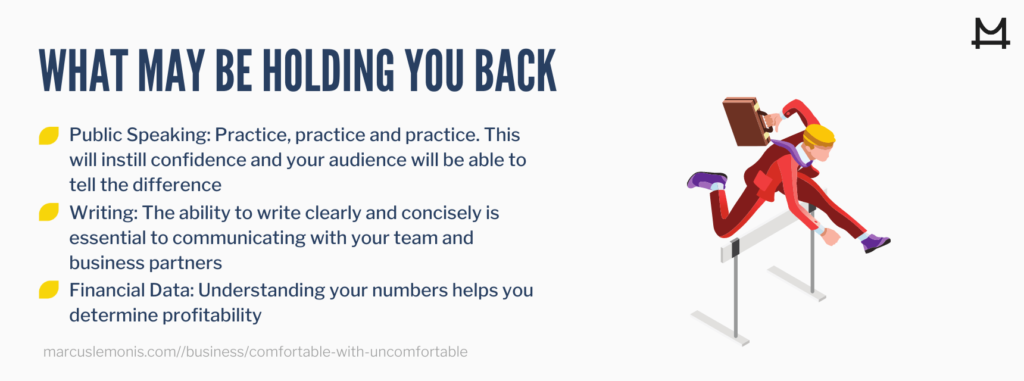
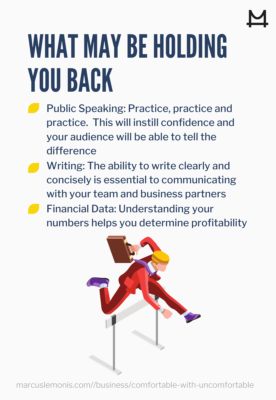
One example comes from a concession trailer company operating out of Florida that designs and builds food trucks for mobile restaurateurs. When Marcus took a close look at the business, he found that the owners were uncomfortable talking about their financials.

Marcus discovered that the business’s annual profit was about half the $400,000 the owners thought they were making. And the inventory of truck parts and assemblies was only $20,000 rather than the owners’ $100,000 estimate. Those discrepancies, along with the owners’ personality clashes, led him to turn down an investment deal.
Fortunately, there are many sources of financial education, including your own accountant and online sites. When it comes to your balance sheet or income statement, you need to start being comfortable with being uncomfortable.
Changing Your Attitude
It’s not just gaps in knowledge or experiences that make owners feel uncomfortable. There are a host of personality issues related to attitudes, emotions and behaviors that can hold you back. Think about how you handle relationships with family, friends and employees. Is there a pattern that you can identify? Are there bad habits you need to change? Here are some issues to consider.

-
- Blaming other people. When things go wrong, do you lash out at other people? If so, you should try to break that habit. Mistakes can occur for many reasons, including unclear instructions or inadequate training. Play the blame game too often and a good employee could leave your business. So, try to understand the situation first, and let your brain decide how to handle things.
- Receiving critical feedback. While no one likes to be criticized, try to approach it with a positive mindset. The other person is giving you valuable feedback, so you should listen carefully rather than immediately getting into an argument. Keep a clear head and you can turn a problem into an opportunity to improve the situation with a customer or employee. This is one of the most important steps to being comfortable with being uncomfortable.
- Getting in over your head. Perhaps you over promised and under delivered to a client or tried to expand to a new market without the necessary resources. Rather than stay awake worrying night after night, find steps you can take to remedy the situation. That might mean hiring a new person, finding a new supplier or simply cutting your losses. Again, the key is to think things through, rather than let your emotions rule your actions.
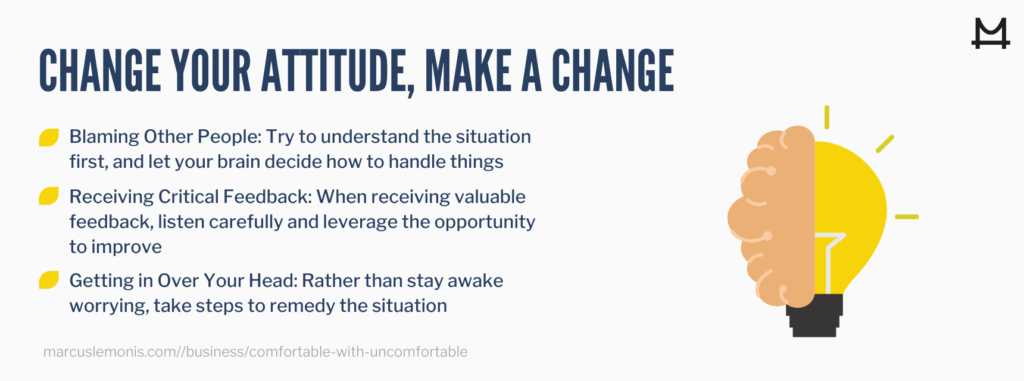
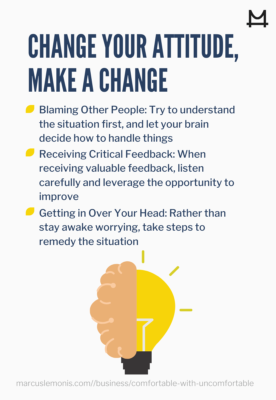
That’s a lesson that could have helped the founder of a health food company in South Florida. After receiving endorsements from several athletes, the company owner was able to launch a successful sales campaign, delivering healthy meals to customers trying to improve their fitness and physique. But when Marcus talked with the owner about taking the company to the next level, he discovered the owner had issues with his investors, employees and customers. In short, the founder had gotten in over his head and wasn’t fulfilling his end of the bargain. It didn’t take long for Marcus to exit this deal.
You can make a change
Before you say, “I’ll never be able to make a change for the better,” ask yourself the following question: If someone offered me $1 million to step out of my comfort zone, could I do so?

The answer would probably be a big yes! Now, think about your business and how much money you might be leaving on the table, month after month, and year after year. That’s a big reason to start being comfortable with being uncomfortable.
So, take a risk and be prepared to enjoy the rewards. As Marcus says, “The definition of an entrepreneur to me is the willingness to fail, and it takes a lot of guts and a lot of heart to take that chance.”
- What are some ways you overcome uncomfort?
- What new ways of overcoming uncomfort will you try based on this article?





